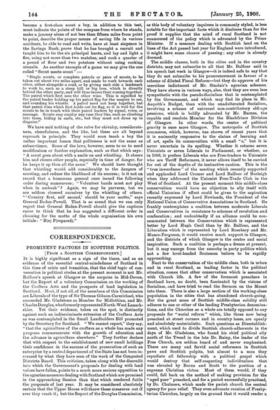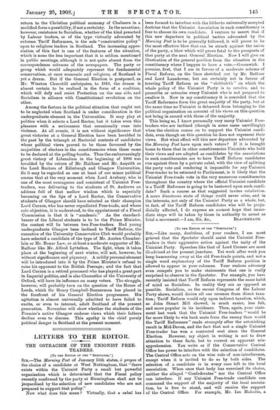CORRESPONDENCE.
PROMINENT FACTORS IN SCOTTISH POLITICS. [FRom A SCOTTISH CORRESPONDENT.] IT is highly significant as a sign of the times, and as an evidence of the essential central-mindedness of Scotland in this time of crisis and transition, that the chief topic of con- versation in political circles at the present moment is not Mr. Balfour's speech at Glasgow or the surprise in Mid-Devon, but the Report of a voluntary Commission on the working of the Crofters Acts and the prospects of land legislation in Scotland. Most, if not all, of the members of this Commission ale Liberals of the type of Sir Thomas Gibson-Carmichael, who succeeded Mr. Gladstone as Member for Midlothian, and Mr. Charles Douglas, who formerly represented North-West Lanark- shire. Yet their evidence, taken on the spot, is distinctly against such an indiscriminate extension of the Crofters Acts as was contemplated in the Small Landholders Bill promoted by the Secretary for Scotland. "We cannot report," they say, "that the agriculture of the crofters as a whole has made any progress commensurate with the growth of education and the advance in agriculture elsewhere." They further declare that with respect to the establishment of new small holdings their confidence in the success of the prosecution of such an enterprise by a central department of the State has not been in- creased by what they have seen of the work of the Congested Districts Board. This criticism, taken along with the discredit into which the Government's proposals for dealing with land values have fallen, points to a much more serious opposition to the agrarian measures dealing with Scotland which are promised in the approaching Session than that which rendered futile the proposals of last year. It may be considered absolutely certain that the Upper House will throw these measures out if ever they reach it ; but the Report of the Douglas Commission,
as this body of voluntary inquirers is commonly styled, is less notable for the important facts which it discloses than for the proof it supplies that the mind of rural Scotland is not enamoured of the policy which is advocated by the Prime Minister. If a measure dealing with Scottish land on the lines of the Act passed last year for England were introduced, it might have some chance of passing ; any other is already doomed.
The middle classes, both in the cities and in the country districts, may not subscribe to all that Mr. Balfour said in his speech last week in Glasgow—it is indeed safe to say that they do not subscribe to his pronouncement in favour of a scheme of diluted Fiscal Reform—but they do approve of his merciless indictment of Mr. Sinclair's agrarian schemes. They have shown in various ways, also, that they are even less sympathetic with the pseudo-Socialism that is contemplated by the Government, and which may find its place in Mr. Asquith's Budget, than with the unadulterated Socialism, involving a scheme of universal non-contributory old-age pensions, which is boldly advocated by Mr. Barnes, the capable and resolute Member for the Blackfriars Division of Glasgow. In other words, the centre of political gravity is once more Glasgow. The metropolis of Scottish commerce, which, however, has shown of recent years that it is eminently responsive to the claims of learning and of art, spells its conservatism with a small "c," but it is never uncertain in its spelling. Whether it returns seven Unionists or seven Liberals to Parliament, or whether, as in 1906, it prefers Liberals who are Free-traders to Unionists who are Tariff Reformers, it never allows itself to be carried far out of the depths of its instinctive caution. This is the "true inwardness" of the meeting which recently supported and applauded Lord Cromer and Lord Balfour of Burleigh when they addressed the Unionist Free-Trade Club in the West of Scotland. At the present moment this middle-class conservatism would have no objection to ally itself with official Unionism if effect could be given to the aspiration recently expressed by Lord Newlands, the President of the National Union of Conservative Associations in Scotland. He frankly contemplates a coalition between moderate Liberals and Conservatives in resistance to schemes of revolution and confiscation ; and undoubtedly if an alliance could be con- summated between the Conservatism which is represented better by Lord Hugh Cecil than by Mr. Balfour, and the Liberalism which is represented by Lord Rosebery and Mr. Munro-Ferguson, it would receive much support in Glasgow, and the districts of which Glasgow is the centre and social inspiration. Such a coalition is perhaps a dream at present, but it may emerge from the anarchy in party politics which not a few level-headed Scotsmen believe to be rapidly approaching.
Next to the conservatism of the middle class, both in urban and in rural Scotland, as leading factor in the political situation, comes that other conservatism which is associated with Church life. A few of the foremost preachers in Scotland have, no doubt, been fascinated by the visions of Socialism, and have tried to read the Sermon on the Mount into them. There is also a large section of the working-class population in the cities that has abandoned church-going. But the great mass of Scottish middle-class solidity still adheres to one or other of the leading Presbyterian denomina- tions, and the Churches as a whole are totally opposed to any proposals for "social reform" which, like those now being preached at street corners and in country lanes, are openly and absolutely materialistic. Such questions as Disestablish- ment, which used to divide Scottish church-adherents in the days of Mr. Gladstone, who found his chief political ally north of the Tweed in the late Dr. Rainy, the leader of the Free Church, are seldom heard of and never emphasised. There are many and fervid social reformers in Scottish pews and Scottish pulpits, but almost to a man they repudiate all fellowship with a political gospel which would destroy that self-respecting individualism that was elevated by Burns and Scott to the position of a supreme Christian virtue. Most of them would, if they could, fall back on the method of making provision for the "aged poor" preached, and for a period successfully practised, by Dr. Chalmers, which made the parish church the central agency for poor relief. They even advocate reunion of Presby- terian Churches, largely on the ground that it would render a
return to the Christian political economy of Chalmers in a modified form a possibility, if not a certainty. In the meantime, however, resistance to Socialism, whether of the kind preached by Labour leaders, or of the type virtually advocated by extreme Tariff Reformers, is the sole "constructive policy" ' open to religious leaders in Scotland. The increasing appre- ciation of this fact is one of the features of the situation, which is none the less important that it is seldom mentioned in public meetings, although it is not quite absent from the • correspondence columns of the newspapers. The party or group which would adequately represent the fundamental conservatism, at once economic and religious, of Scotland is yet a dream. But if the General Election is postponed, as Mr. Winston Churchill anticipates, to 1910, the dream is almost certain to be realised in the form of a coalition, which will defy and resist Protection on the one side, and • Socialism in alliance with Constitutional revolution on the other.
Among the factors in the political situation that ought not to be neglected when Scotland is under consideration is the undergraduate element in the Universities. It may play at politics when it selects a Lord Rector, but it takes even this pleasure with a seriousness that occasionally runs into • violence. At all events, it is not without significance that great victories at a General Election have been heralded in the past by the triumph at Rectorial contests of candidates whose political views proved to be those favoured by the majorities of electors in the constituencies when these came to be declared at the polling-booths. Thus the embarrassingly great victory of Liberalism in the beginning of 1906 was heralded by the return of Mr. Haldane and Mr. Asquith as the Lord Rectors of Edinburgh and Glasgow Universities. So it may be regarded as one at least of our minor political omens that at the very moment when Lord Avebury, who is one of the most courageous and consistent of Unionist Free- • traders, was delivering to the students of St. Andrews an address full of that mellow wisdom which is especially becoming on the lips of a Lord Rector, the Conservative students of Glasgow should have selected as their champion 'Lord Curzon, who has never repudiated Free-trade, and whose sole objection, it is understood, to the appointment of a Fiscal Commission is that it is "academic." As the standard- bearer of the Liberal students is to be the Prime Minister, the contest will lie between two Free-traders. Had young undergraduate Glasgow been inclined to Tariff Reform, the executive of the University Conservative Club would probably have selected a candidate of the type of Mr. Austen Chamber- lain or Mr. Bonar Law, or at least a moderate supporter of Mr. Balfour like Mr. Alfred Lyttelton. The fight, when it takes place at the beginning of next winter, will not, however, be without significance and piquancy. A mildly personal element will be introduced into it by the Prime Minister's refusal to raise his opponent to the British Peerage ; and the fact that Lord Curzon is a retired proconsul who has played a great part in Imperial politics, and is also Chancellor of the University of • Oxford, will have its influence on many voters. The struggle, however, will probably turn on the question of the House of Lords, which Sir Henry Campbell-Bannerman has placed in -the forefront of his General Election programme. His agitation is almost universally admitted to have failed to excite, or even to interest, adult Scotland of the present generation. November will show whether the students of the Premier's native Glasgow endorse views which their fathers decline even to discuss. This apathy is the chief purely political danger in Scotland at the present moment.





















































 Previous page
Previous page